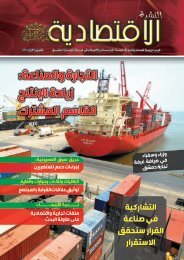SIGAR
2017-01-30qr
2017-01-30qr
You also want an ePaper? Increase the reach of your titles
YUMPU automatically turns print PDFs into web optimized ePapers that Google loves.
ECONOMIC AND SOCIAL DEVELOPMENT<br />
November 2014 and the Supreme Court’s final judgment in December 2014<br />
make enforcement problematic. Much of the property and assets purchased<br />
with the stolen Kabul Bank funds are located in the United Arab Emirates<br />
(UAE), but the Dubai courts view the language—particularly regarding the<br />
identification and seizure of properties and assets—as “conditional” and<br />
lacking “legal certainty or legitimacy.” A KBR representative said the entire<br />
judgment/decision is not legally enforceable in Afghanistan either. It is<br />
therefore unclear how the Afghan government should address violations. 631<br />
“Sincere efforts to recover funds continue to be impeded by intimidation<br />
of those attempting to do their jobs,” according to a U.S. Institute of<br />
Peace report. 632 In at least one instance this quarter, debt-collection efforts<br />
were directly hindered. According to DOJ, the Kabul Bank Court of First<br />
Instance, created to address the cases of individuals involved in the scandal,<br />
undermined an order of the higher court and tried to preclude attempts to<br />
collect assets from identified companies and individuals. DOJ said this will<br />
encourage other debtors to also try to undermine their existing judgments<br />
by appealing their assessed liabilities to the Special Court. 633<br />
Although President Ghani has asked <strong>SIGAR</strong> to help detect and retrieve<br />
Kabul Bank assets in foreign countries, 634 Afghan authorities have not<br />
pursued all options for international assistance in their Kabul Bank recovery<br />
effort. In April 2015, DOJ received a one-page diplomatic note from<br />
the Afghan government requesting its assistance in seizing the U.S. bank<br />
accounts of two Afghan debtors. The accounts presumably belonged to<br />
ex-Kabul Bank chairman Sherkhan Farnood and CEO Khalilullah Ferozi. In<br />
its May 2015 response, DOJ noted several deficiencies in the request, along<br />
with the corrective actions needed to move forward. As of December 2016,<br />
the Afghan government has not responded or corrected the deficiencies. 635<br />
Additionally, since much of the stolen money was laundered to Dubai<br />
and subsequently invested in real estate there, the Afghan government<br />
prepared and signed an official request to United Arab Emirate authorities<br />
in June 2016 to “identify, locate, provide documents and records, and conduct<br />
a search and seizure of any and all records and balances associated<br />
with the bank accounts listed.” However, it was not delivered until August<br />
2016. It was resubmitted in September 2016 after the UAE said it could not<br />
read the original copy. The UAE has not responded to the request, as of<br />
November 2016. 636<br />
The Afghan government’s approach so far has had no apparent consequences,<br />
even though the current basis of donor support, the Self-Reliance<br />
through Mutual Accountability Framework (SMAF), includes a general<br />
“zero-tolerance” corruption policy and calls for transparent and accountable<br />
governance. 637 Meanwhile, U.S. government officials have said in<br />
meetings with Afghan officials that the United States will hold the Kabul<br />
government to its promises to address endemic corruption, including taking<br />
action against those responsible for Kabul Bank’s near collapse. 638<br />
158<br />
SPECIAL INSPECTOR GENERAL I AFGHANISTAN RECONSTRUCTION







